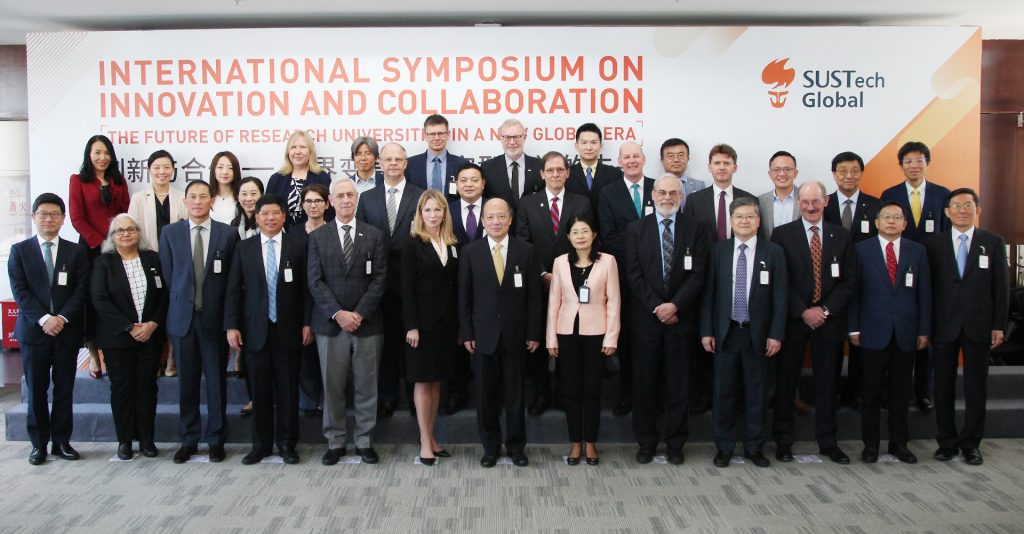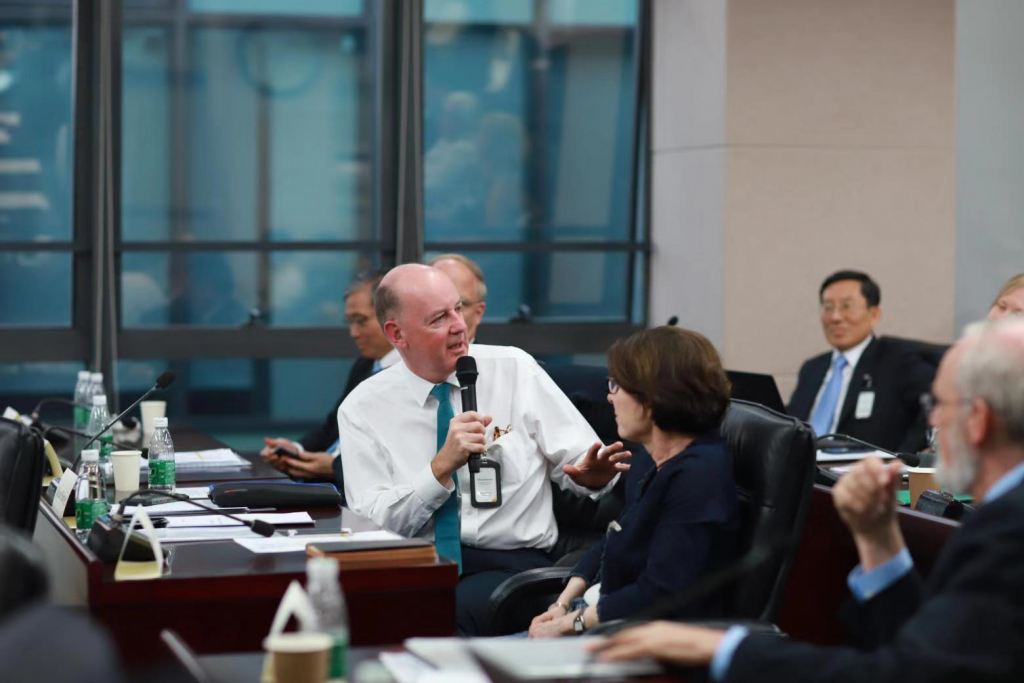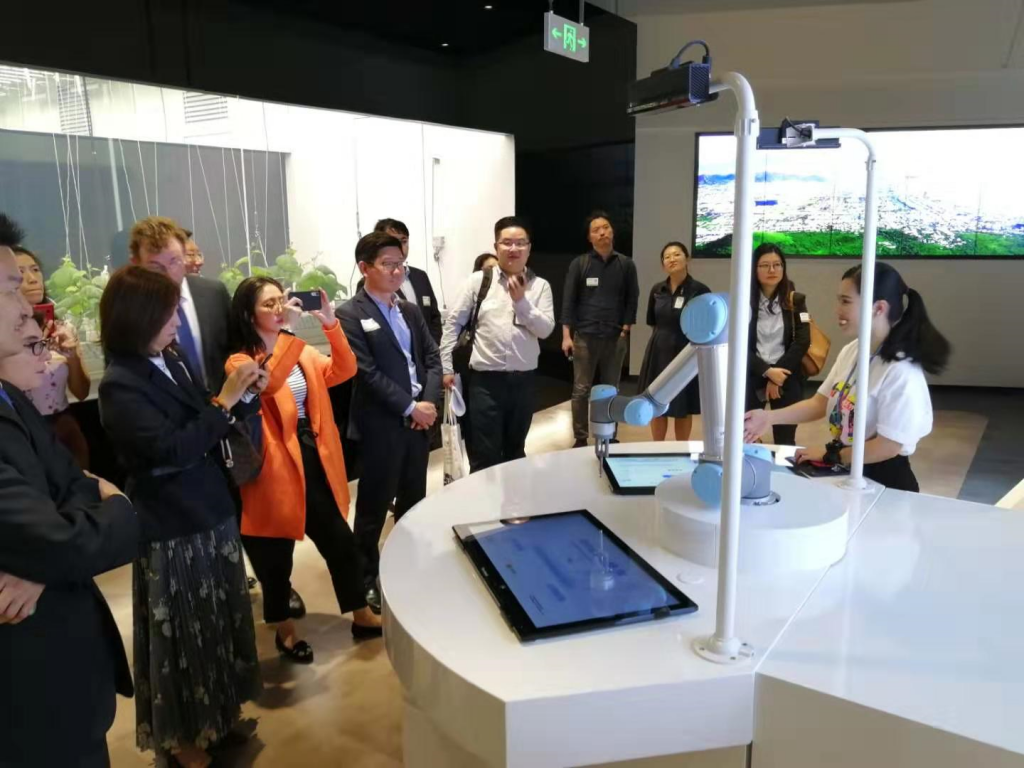Academic leaders in global engagement from four continents joined together at the first International Symposium on “Innovation and Collaboration: The Future of Research Universities in a New Global Era” held at Southern University of Science and Technology (SUSTech), Shenzhen, on Sunday, Nov. 10 and 11. The conference was organised by SUSTech Global, the university’s international office on the 5th anniversary of global partnership development at this young university. SUSTech President Chen Shiyi, a staunch champion of internationalization at both SUSTech and across Chinese higher education, attended and met with the more than 50 attendees representing over 30 world-renowned institutions.

Delegates debated the dawn of a new global era in the context of intensified competition driven by technological innovation, the responsibilities of research universities towards society, the necessity for universities to keep collaborating across borders, and the new strategies that shall be developed to maintain internationalization of universities in spite of rising diplomatic tensions.
In his opening remarks, Zhang Dongxiao, Provost and Acting Vice President of SUSTech stated the importance of international partnership to SUSTech as a new university striving for world-class quality, pivotal role in regional development, and global impact. Tan Fuying, Associate Director of Shenzhen Foreign Affairs Office, underscored how SUSTech’s extensive international collaboration involves institutional leaders, scholars and students had aligned so well with the goals of the Greater Bay Area development plan and the city of Shenzhen’s ambition to grow into a modern metropolis and an international hub for innovations.
The defining theme of the day’s discussions was undoubtadly the constraints on international academic collaboration from shifts in the geopolitical environment and the unchanged commitment of higher education leaders to education and research collaborations across borders. The tone was set by opening remarks of Caroline Levander, Vice President of Global and Digital Strategy at Rice University on behalf of symposium participants, who passed on the words of Rice’s President David Leebron that “leading research universities have served as global bridges and we do so even through times of increased tension”.
The role of research universities as bulwarks against the tides of isolationism and self-interest was reiterated across the symposium, as speakers stressed the impossibility of global decoupling in a world interconnected on all levels. SUSTech Vice-Provost of Global Strategy Zheng Chunmiao emphasized in his keynote speech ‘The new Chinese universities and their international drive’ that the “problems we face are global in nature, so we need global collaboration”, and he sketched the very particular international profile that a new generation of Chinese universities and SUSTech have implemented.
Eric Grimson, Chancellor for Academic Advancement at the Massachusetts Institute of Technology (MIT), spoke on ‘International collaborations in higher education’ and expounded upon MIT’s innovative programs designed to provide international experiences for their students. Along with other speakers at the symposium, he reported a noticeable change in student motivation over the last generation. Students no longer prioritize a financially rewarding career but look for a professional future where they can make a meaningful impact by addressing societal issues: “Students know they need to have a global perspective and want to tackle global problems.”

The first two panel sessions focused on ‘The future of university international collaborations and the game changers’ and ‘Concepts, practice and challenges of campus internationalization’ and were chaired by Yves H. Berthelot, Vice-Provost for International Initiatives, Georgia Institute of Technology and Rongyu Li, Deputy Vice-Chancellor (External Engagement), University of Queensland, respectively. Panelists debated the responses to the new global era and emphasized academia’s role in strengthening globalisation through its inherently collaborative nature, with Prof. Berthelot stating that “Collaboration is truly in our DNA. We are passionate about it. As educators we want to create the next generation and create new knowledge and solutions. We share a planet.”

In the break between the morning and afternoon sessions, delegates were treated to a tour of the modern looking campus where they visited SUSTech’s state-of-the-art cryo-electron microscopy laboratory before ending at the Lynn Library. Here a poster session was held in celebration of the university’s study abroad programs with partner universities. Student participants from these programs shared their experiences with the delegates, and generated a lively discussion on how international experiences broaden the world view of academic talents.
Chancellor Grimson from MIT was impressed by SUSTech’s global ambitions. He found the similarity between students at SUSTech and MIT is that they all have a passion to change the world. He would like to have further interaction with SUSTech’s students, and encouraged the students to enroll in humanities and social sciences courses and activities to broaden their education.
The afternoon’s keynote speech by Peter Mascher, Vice-Provost (International Affairs), McMaster University, was titled ‘Building of international research networks to address global challenges and to enable knowledge transfer’. He used the example of the U15 group of research universities within Canada and the international ‘Universitas21’ network for an analysis of the critical characteristics that impact the success of networks. They include being people-centered, capacity building across borders, and private-sector engagement.
Mike Shipman, Warwick University’s Pro-Vice-Chancellor (International), delivered the day’s final keynote, ‘Embedding broad-based and deep international partnership – the example of Warwick’s institutional partnership with Monash University’. His remarks made a compelling case for the value of forging strategic partnerships with institutions that share a similar spirit and academic mission.
The afternoon panels focused on ‘University teaching and learning in the global era’, chaired by Albert Chau, Vice-President (Teaching and Learning), Hong Kong Baptist University, and ‘The social responsibilities and sustainable future of universities’, chaired by Nathalie Lugagne, Vice Dean for Executive Education, HEC Paris. They delved into the remarkable recent shift in focus of research universities towards civic engagement and producing tangible responses to global challenges such as climate change.
In the final reflective discussion section, chaired by Gerard A. Postiglione, Chair Professor, University of Hong Kong and Council Member of the SUSTech Higher Education Research Center, further elaboration of topics debated during the day moved from the motivations of students to the role rankings play in higher education.

On the second day, SUSTech arranged visits for the symposium participants to industry partners. Richard Harvey, Academic Director of Admissions, University of East Anglia described the Tencent visit in particular as “awe-inspiring… very, very illuminating” as well as his admiration for the DJI-SUSTech education program.
Mike Shipman commented on his visits of Huawei and the National Gene Bank, “Really interesting high technology businesses where clearly the integration of knowledge, innovation, learning has a big impact on the products and initiatives that they can deliver. Great to see.”
Leo Mian Liu, Vice President (Global Partnerships) and Director, UTS International believed the visits “Showed the strong link between SUSTech and industries and the corporate world. I think that one of the key features of SUSTech is having close industry linkage”.
The overall message of the symposium was one of perseverance and optimism in the face of increasing global uncertainty, with delegates reaffirming that global universities have to assume responsibility and stand up for global engagement.
Proofread By
Photo ByGlobal Engagement Office